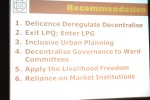Jeevika campaign organized a panel discussion “Street Vending in India: Law, Liberty & Livelihood” on August 31, 2012 during “Jeevika: Asia Livelihood Documentary Film Festival” in Delhi. The campaign team took the opportunity of having a diverse intellectual audience to showcase campaign work in Rajasthan and Bihar. The objective of the session was to discuss issues, developments, solutions, new central legislation and challenges regarding street vending. The session created awareness regarding street vending as a legitimate occupation of entry level professions in informal economy to enhance livelihood opportunities of urban poor and sensitized audience to look for the possibility of liberal solution.
The panel discussion started with a presentation by Amit Chandra, Jeevika National Coordinator on the campaign work and how our policy advocacy effort is working on getting street vending, rickshaw pulling and artisanship legal recognition. He gave overview of the issues, developments and possible solutions for the problems in entry level professions of informal sector to relive ailing poor. Addressing the audience Amit Chandra said, “Is the problem in our society inequality of outcomes or inequality of opportunity. Inclusive growth requires inclusive reforms. With our effort Rajasthan has passed a legislation to make street vending legitimate part of urban planning. The implementation of the law is yet to take place but it has legally empowered street vendors in the state to protect their right to livelihood and property.”
Dr Parth J. Shah, president of CCS discussed about the liberal market based policy solutions to identified problems of informal sector and mentioned why most of the policy initiatives in past have failed to solve the problems. He said, “Our policy solutions tried so far lacked market based solutions. There have been several policy initiatives to recognize contribution of street vendors in informal economy but no action has been taken so far leaving aside a few. Due to corruption at lower level of bureaucracy urban local bodies have not started implementing policies which allows harassment and extortion of poor street entrepreneurs. The poor street entrepreneurs of Delhi alone are forced to pay bribe of around Rs 144/- Crore. The irony of the day is even after paying such a large amount their means of livelihood is not secure.”
Good amount of time was spent interacting with audience through question answer session. The discussion was moderated by Jeevika Festival Director Mr Manoj Mathew.
Here are a few pictures of the panel discussion:
- Amit Chandra Making Presentation
- Audience Raising Questions 1
- Audience Raising Questions 2
- Audience Raising Questions 3
- Civil Society Recommendations
- Dr Parth Shah in Panel
- Panel and Engaged Audience
- The Panel









